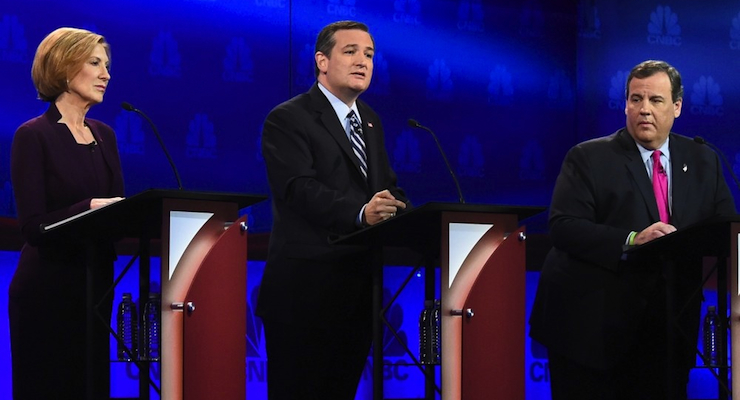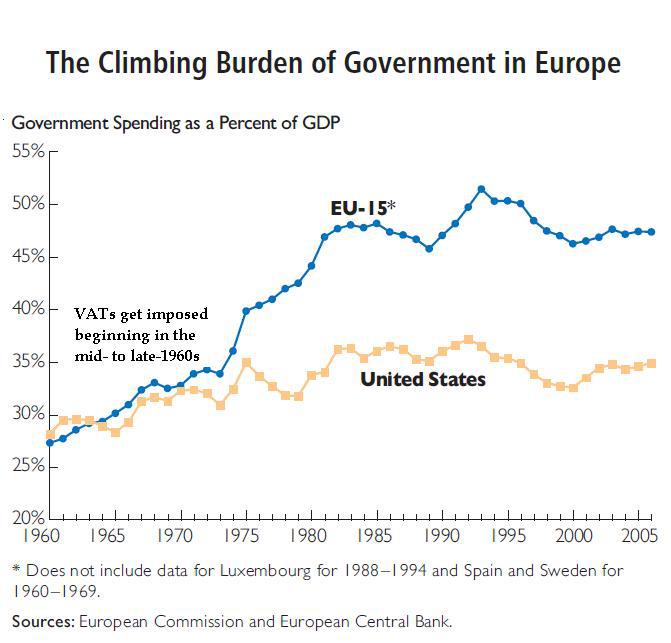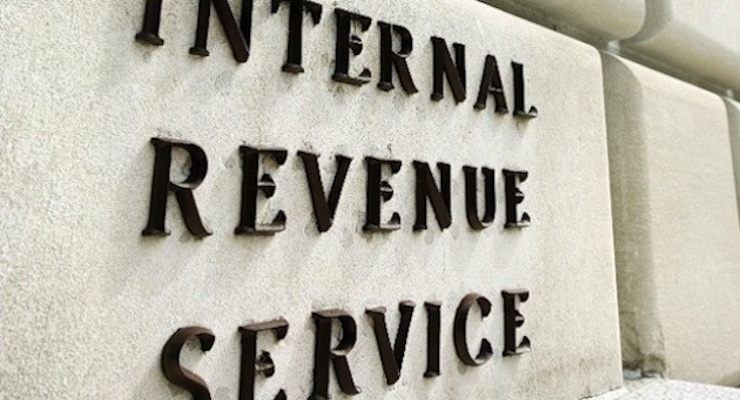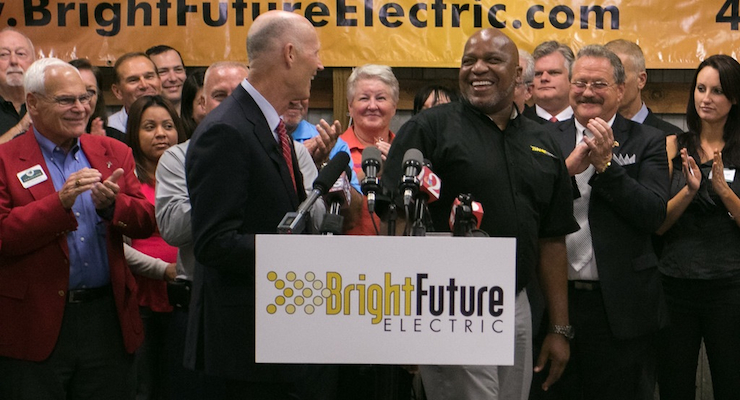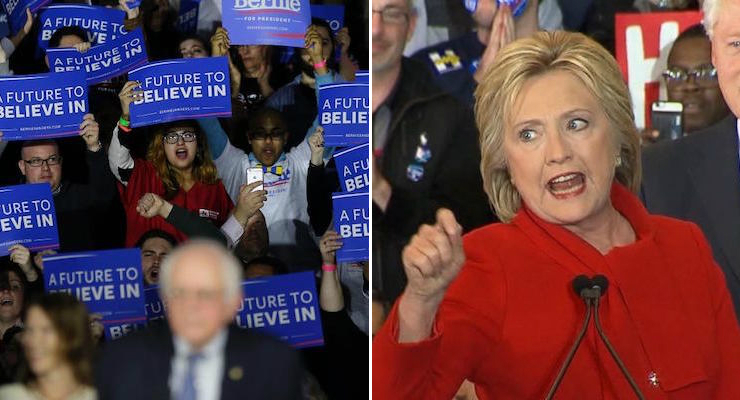
Vermont Sen. Bernie Sanders, left, at the at the Holiday Inn on Feb. 1, 2016 in Des Moines, Iowa, while Hillary Clinton, right, speaks on the evening of the Iowa Democratic caucus, Feb. 1, 2016. (Photo: Joshua Lott/Getty Images/AP)
Once again, I threw myself on a proverbial grenade. Yes, that means I watched politicians last night as part of the Cato Institute’s live-tweeting about issues that were raised (or not raised) in the CNN Townhall featuring Bernie Sanders and Hillary Clinton.
Although painful, this exercise enabled me to share my thoughts on topics such as corporate inversions, Planned Parenthood, government-run healthcare, Obamanomics, and the morality (or lack thereof) of government-coerced redistribution.
But one issue I neglected was campaign finance, which was an oversight since both Sanders and Clinton made a big deal about the ostensibly corrupting mix of money and politics.
I confess that their arguments were somewhat seductive. After all, corrupt ethanol handouts and the cronyist Export-Import Bank only exist because politicians easily can raise tens of thousands of dollars by voting yes for these boondoggles.
Moreover, a law professor from the University of Minnesota made “The Conservative Case for Campaign-Finance Reform” yesterday in the New York Times. Here’s some of what Richard Painter wrote.
…big money in politics encourages big government. Campaign contributions drive spending on earmarks and other wasteful programs — bridges to nowhere, contracts for equipment the military does not need, solar energy companies that go bankrupt on the government’s dime… When politicians are dependent on campaign money from contractors and lobbyists, they’re incapable of holding spending programs to account. Campaign contributions also breed more regulation. Companies in heavily regulated industries such as banking, health care and energy are among the largest contributors. Such companies donate with the hope of winning narrowly tailored exceptions to regulations that help them and disadvantage their competitors. …conservatives…need to drive the big spenders out of the temples of our democracy.
I have no idea if Mr. Painter actually is a conservative, but he makes a superficially compelling case.
But then I remind myself of a very important point. The sun doesn’t rise because roosters crow. It’s the other way around. What Mr. Painter fails to understand is that there’s a lot of money in politics for the simple reason that government has massive powers to tax, spend, and regulate.
Politicians in Washington every year redistribute more than $4 trillion, so interest groups have an incentive to “invest” money in campaigns so they can get some of that loot. Those politicians have created a 75,000-page tax code that is a Byzantine web of special preferences, so interest groups have an incentive to “invest” money in campaigns so they get favorable treatment. And the politicians also have created a massive regulatory morass, so interest groups have an incentive to “invest” so that red tape can be used to create an unlevel playing field for their advantage.
By the way, I’m not saying that campaign contributions are improper, or even necessarily bad.
After all, political speech (and the money that makes it meaningful) is protected by the 1st Amendment. Moreover, some people give money simply for reasons of self defense. They’re not looking for handouts of favoritism, but rather are giving money in hopes that politicians will leave them alone.
Instead, I’m simply making the point that big government is what encourages unseemly and/or corrupt political contributions.
If I’m allowed to shift to a new metaphor, Sanders and Clinton make the mistake of putting the cart of campaign finance in front of the horse of big government.
There’s a great column in today’s Wall Street Journal on this topic. It’s motivated by corruption scandals in New York, but the lessons apply equally to Washington. Here’s some of what Tom Shanahan wrote.
…whenever a public official is found guilty of wrongdoing, there’s a call for new laws. Logic cannot explain the impulse. …If they’re not obeying the laws we already have, what makes anyone believe new statutes will change that? …a host of “good government” groups, such the New York Public Interest Research Group, proposed making the legislature a “full-time job” by limiting outside income.
Mr. Shanahan suspect these reforms will backfire.
That’s a major problem for limiting the size of government. An analysis of “The Length of Legislative Sessions and the Growth of Government” byMwangi S. Kimenyi and Robert D. Tollison, in a 1995 article in Rationality and Society, demonstrated that the more time Congress spent in session, the more bills were enacted, and the more expensive government grew. …A legislator with other work also has a better understanding of the economic conditions confronting the public than one who subsists on a government check. …Legislators with outside incomes are less susceptible to the pay-to-play temptation of campaign contributions. When your sole source of income is the public office you hold, the incentive is far greater to do anything necessary to get re-elected.
So here’s the bottom line is that there’s no reason to think new laws will reduce corruption. Indeed, more rules will probably lead to more sleaze since politicians will have an even greater incentive to exploit their positions of power.
The people who will get hurt, however, are the ordinary citizens who already lose out from the current system.
New York continues to suffer a net migration of citizens to other states, as people flee a growing tax burden. The last thing the state needs is a legislature working full time to spend even more taxpayer money.
By the way, I’m not under the illusion that “money in politics” is a solution. I’m simply saying that new rules about campaign finance and ethics won’t have any impact on sleaze and corruption.
Which is my message in this video from the Center for Freedom and Prosperity.
[brid video=”8397″ player=”2077″ title=”Mitchell Want Less Corruption Shrink the Size of Government”]
Allow me to make one final point on this issue. I think the proponents of further regulation and control in some cases have good intentions, but they are being extremely naive. Why would anybody think that politicians would approve rules unless the net effect was to increase the powers of incumbency?
Since I shared my video on the topic, I’ll close by strongly recommending that you watch this George Will video.
P.S. I warned last month that governments were engaged in a war on cash. Well, the Germans are planning a Blitzkrieg.
The German government is considering introducing a limit of 5,000 euros ($5,450) on cash transactions in an effort to combat money laundering and financing of terrorism. Deputy finance minister Michael Meister said Wednesday that…there’s “…we also have the problem of how to clear up money-laundering offenses properly” when large transactions are conducted anonymously. …Opposition Green Party lawmaker Konstantin von Notz tweeted that trying to limit cash payments “is a new fundamental attack on data protection and privacy.”
Since criminals will be modestly inconvenienced – at best – by such an initiative, it’s important to understand the real goal is easier tax collection. Indeed, I suspect Herr von Notz will change his tune once he realizes that the German government will get more money to waste if cash is restricted.


